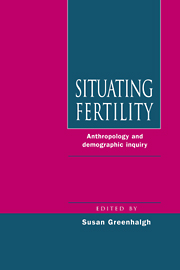Book contents
- Frontmatter
- Contents
- List of figures
- List of tables
- List of contributors
- Preface
- Conceiving reproduction: Trans-disciplinary views
- 1 Anthropology theorizes reproduction: Integrating practice, political economic, and feminist perspectives
- 2 Political-economic and cultural explanations of demographic behavior
- The social management of fertility
- Gender, class, and clan: The social inequality of reproduction
- Afterword: (Re)capturing reproduction for anthropology
- References
- Index
2 - Political-economic and cultural explanations of demographic behavior
Published online by Cambridge University Press: 07 December 2009
- Frontmatter
- Contents
- List of figures
- List of tables
- List of contributors
- Preface
- Conceiving reproduction: Trans-disciplinary views
- 1 Anthropology theorizes reproduction: Integrating practice, political economic, and feminist perspectives
- 2 Political-economic and cultural explanations of demographic behavior
- The social management of fertility
- Gender, class, and clan: The social inequality of reproduction
- Afterword: (Re)capturing reproduction for anthropology
- References
- Index
Summary
The last decade has been a stormy time for demographic theory. Long-held theories and paradigms for explaining demographic behavior have come under relentless fire, and even the methods employed by demographers to explain such behavior have come in for sharp criticism. What is most notable about this development from an anthropologist's viewpoint is how much the criticisms being voiced by demographers reflect perspectives, methods, and concepts traditionally identified with anthropology. Curiously, this rethinking has not primarily come as a result of demographic work done by anthropologists, nor is it due to anthropologists' criticisms of the work done by demographers. Rather, it has largely sprung from within the ranks of demographers who have had little if any anthropological training.
There are many facets to this movement, including, for example, the call for intensive village studies to supplement demography's typical survey methods (Leibenstein 1981:397; Caldwell, Reddy, and Caldwell 1988). However, I here focus on one of the central theoretical issues that emerges from this confrontation: the role of culture in demographic explanation. In doing this, I examine the attempts to replace more traditional economic perspectives with cultural explanation in demographic studies. This movement actually has two different (though not always clearly distinguishable) threads. In the one most commonly articulated by demographers, culture is treated as a grab-bag of non-demographic, non-economic characteristics that influence behavior without themselves being susceptible to economic or demographic explanation.
- Type
- Chapter
- Information
- Situating FertilityAnthropology and Demographic Inquiry, pp. 29 - 52Publisher: Cambridge University PressPrint publication year: 1995
- 25
- Cited by



